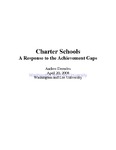Charter Schools: A Response to the Achievement Gaps

View/
Author
Deoudes, Andrea
Subject
Washington and Lee University, Shepherd Poverty Program
Charter schools
Academic achievement
De facto school segregation
KIPP
Metadata
Show full item recordDescription
Andrea Deoudes is a member of the Class of 2008 of Washington and Lee University. Capstone; [FULL-TEXT FREELY AVAILABLE ONLINE] The racial and SES-based student achievement gaps that plague United States public school children have devastating effects on post-secondary opportunities and success of low-income and minority students. . . . Because of these disturbing, long-term effects, educators and policy makers have become quite concerned with the achievement gap and are making significant efforts to understand the problem in order to develop ways to successfully tackle it.
One cause that undoubtedly contributes to the achievement gap is school quality. . . . However, the existence of student achievement gaps in the United States indicates that the public education system only further sets back disadvantaged students. . . . Accordingly, different school models and curricula with more resources may be necessary to generate poor and minority student achievement that is equal to white and wealthier children. One controversial reform is the charter school movement. Although charter schools across the board have not had great success at improving low-income and minority student achievement, two models in particular have done quite well: Knowledge is Power Program (KIPP) and YES Prep. Andrea Deoudes